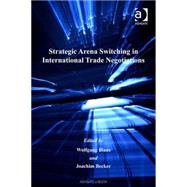- ISBN: 9780754649168 | 0754649164
- Cover: Hardcover
- Copyright: 2/1/2007
This book employs a multi-level and multi-arena perspective in order to analyse global rule making for international trade. It seeks to explain why actors - state actors and non-state actors - prefer specific arenas of global rule-making. And it deals with the question of which institutional designs serve the aims of specific groups better and how are the rules of the different arenas related.Since the 1970s global rule-making with respect to international trade has increased in importance. Political and academic attention has been focused either on global institutions like the IMF, the World Bank, the WTO and UN organisations or on regional blocs like the EU or NAFTA. As negotiations take place in different international arenas, these arenas themselves take on added strategic significance, with agenda pursued and switched from one arena to another. Should one route is blocked. While dominant actors have sought to use arena switching to their advantage, subordinate actors have begun to reactivate alternative arenas of negotiation in order to pursue their different agendas. This book employs a multi-level and multi-arena perspective in order to analyze global rule-making in international trade. It seeks to explain why actors - state actors and non-state actors - prefer particular arenas. And it deals with the question of which institutional designs serve the aims of specific groups best and how the rules of the different arenas are related.






